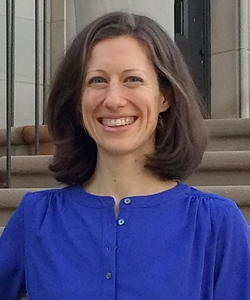When I was in fourth grade, I dressed up as Susan B. Anthony and recounted her biography from the first person perspective for a class assignment. Sharing the same home—Rochester, New York—and the same first name as the pioneer in women’s rights, Susan B. Anthony was one of my heroes from a young age.
During high school and college, part of my developing adult identity was strongly as a “feminist.” I also started to delve deeper into my Catholic faith. In high school, I saw a made-for-television movie about Roe vs. Wade, and it made me think that abortion might be a good option for women facing an unplanned pregnancy. Then I prayed about it and was struck by the miracle of the creation of all life. I believe that we are co-creators with God, and that life begins at conception. Since those teenage years, I have been drawn to the pro-life movement.
As a student at Georgetown University, I began volunteering at the Northwest Center, a small pregnancy center in Washington, D.C. founded by Georgetown University students and alumni. I was excited to put my pro-life beliefs into action. During that time, I first heard, firsthand, the stories of women and the range of circumstances and challenges they face with an unplanned pregnancy. I developed a better understanding of what it means to be pro-life: listening without judgment and helping a woman find resources and support not only during her pregnancy but also beyond.
When I became a social worker, I wanted to support life at all its stages. I worked in child welfare in part to help strengthen families and protect children, building upon my belief in the sacredness of all life.
Many years later, I was lead back to the Northwest Center to run the maternity home program, which provides housing for homeless, pregnant women, and I oversee the pregnancy center program. I am honored to journey with the women I serve throughout their pregnancies and beyond. I have met so many women in a myriad of different circumstances. I strive to listen to each woman with empathy and without judgment. I strive to connect her with resources so that she may choose to continue her pregnancy. I have spoken with far too many women who did not want to choose abortion but felt the pressure from society, family, boyfriends, and other external factors which led them to a decision which they did not freely choose.
When I heard about the Women’s March, I was immediately excited. Then I paused and wondered, would pro-life women be included? I read through the initial postings, and they didn’t mention abortion. I breathed a sigh of relief but continued to wonder about this. As a woman, as a feminist, I wanted to feel included. I realized that abortion and contraception were issues that would inevitably be brought up. However, I looked forward to a unifying march; one in which as women, we could acknowledge that we had very different viewpoints but at the same time could unite in being strong, feminist women. Now was a time to show our solidarity.
The week of the Women’s March, I heard that the New Wave Feminists were no longer permitted to be partners in the march, and it was declared that this was a pro-choice march. I was extremely disappointed. I felt excluded. My hope for unity in such a decisive time was crushed. I wondered if the Women’s March was influenced by institutional power that may have exerted pressure upon the march to include abortion in its principles.
To be a feminist may take many different forms of expression, and feminists hold different beliefs. What I hope and strive for is to be part of a culture in which these different types of feminists all embrace an unconditional love for all women and their inherent dignity, value, and worth. I look forward to the continued space for dialogue, allowing for true listening—even when voicing different opinions.
In the words of Susan B. Anthony, "The day may be approaching when the whole world will recognize woman as the equal of man."

